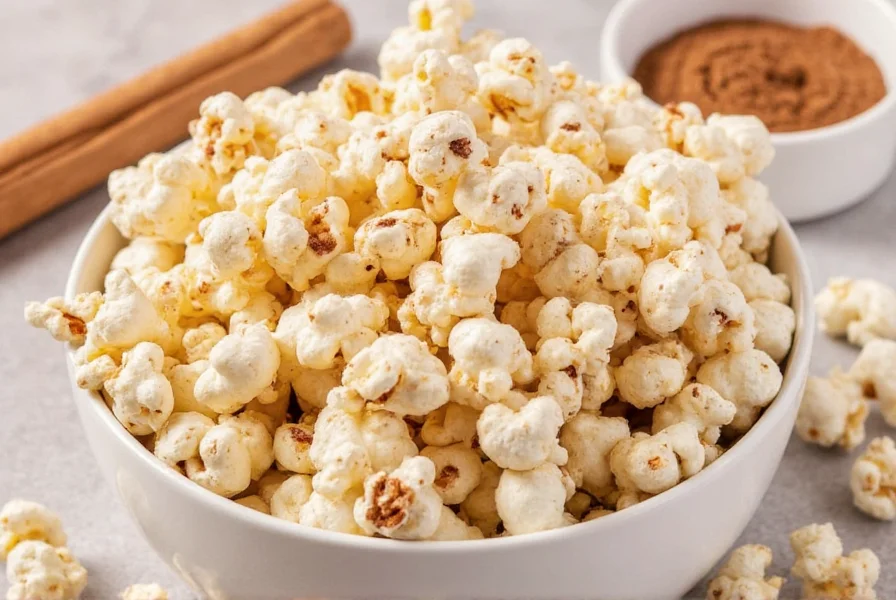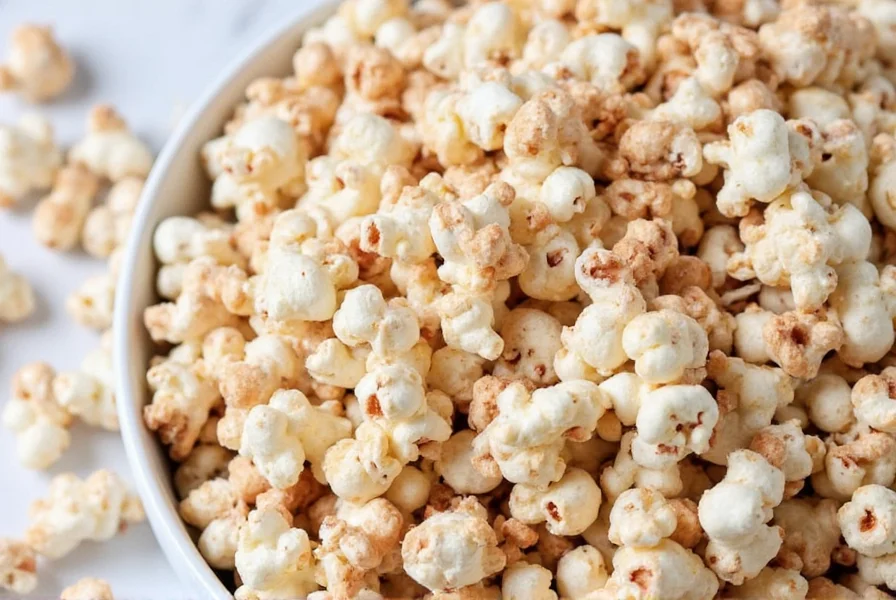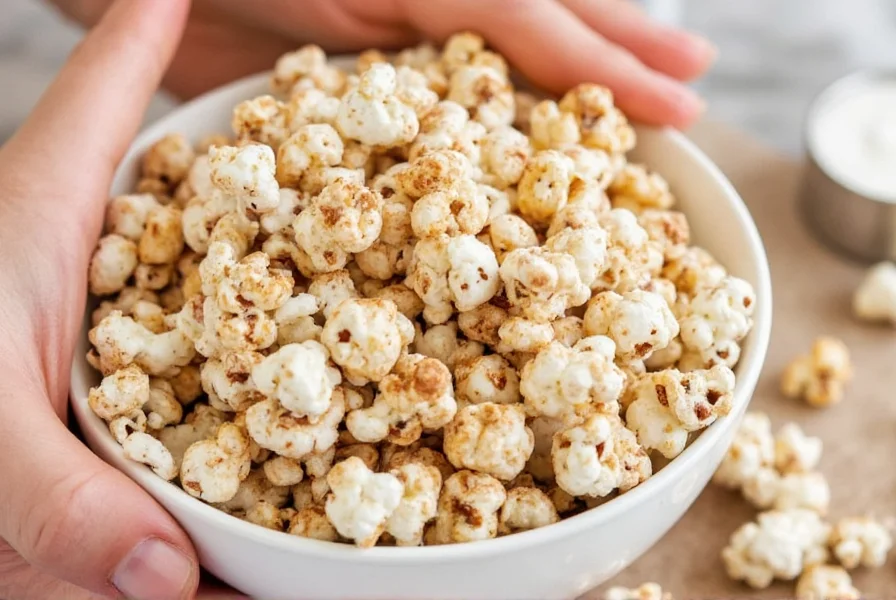For decades, cinnamon sugar popcorn has been a beloved snack across American households, carnivals, and movie theaters. Unlike commercial versions loaded with artificial flavors, authentic homemade cinnamon sugar popcorn relies on quality ingredients and proper technique to achieve that perfect balance of sweet warmth and satisfying crunch.
The Science Behind the Perfect Cinnamon Sugar Ratio
Getting the cinnamon to sugar ratio right makes or breaks this classic snack. Through extensive testing, food scientists have determined that a 1:2 ratio of cinnamon to sugar creates optimal flavor distribution without overwhelming the palate. For every 8 cups of freshly popped popcorn (approximately 4 quarts), use:
| Popcorn Volume | Sugar | Cinnamon | Butter or Oil |
|---|---|---|---|
| 4 cups | 1 tbsp | 1/2 tsp | 1 tsp melted |
| 8 cups | 2 tbsp | 1 tsp | 2 tsp melted |
| 12 cups | 3 tbsp | 1 1/2 tsp | 1 tbsp melted |
This ratio accounts for cinnamon's potent flavor compounds while ensuring even coating. Using superfine or powdered sugar improves adhesion compared to regular granulated sugar, which can create gritty patches on the popcorn.

Traditional Stovetop Preparation Method
The stovetop method produces the most consistently crisp results for homemade cinnamon sugar popcorn. Follow these professional technique steps:
- Pop 1/3 cup popcorn kernels in 2 tablespoons of coconut oil or vegetable oil over medium heat
- Immediately transfer popped corn to a large mixing bowl (avoiding unpopped kernels)
- Melt 2 teaspoons of unsalted butter and lightly drizzle over popcorn
- Sift together sugar and cinnamon to prevent clumping
- Gradually sprinkle mixture while gently tossing popcorn
- Continue tossing for 2-3 minutes to ensure even distribution
The key to preventing sogginess is applying the cinnamon sugar while the popcorn is still warm but not hot. Excessive heat causes sugar to melt and recrystallize unevenly, creating sticky patches. Professional snack makers recommend waiting 2-3 minutes after popping before adding the coating.
Modern Preparation Variations
While the stovetop method delivers classic results, contemporary kitchen appliances offer convenient alternatives for making cinnamon sugar popcorn from scratch:
Air Fryer Technique
For oil-free preparation, air fryer cinnamon sugar popcorn provides exceptional crispness. Place popped corn in the basket, mist lightly with cooking spray, then add the cinnamon sugar mixture. Toss gently and air fry at 250°F for 3-4 minutes. The circulating hot air helps the coating adhere without making the popcorn soggy.
Microwave Shortcut
When time is limited, microwave cinnamon sugar popcorn works surprisingly well. Combine popped corn with melted butter in a large microwave-safe bowl. Sprinkle with cinnamon sugar mixture, cover with a paper towel, and microwave on medium power for 30 seconds. Let stand for 1 minute before tossing to distribute the coating evenly.

Avoiding Common Cinnamon Sugar Popcorn Mistakes
Even experienced home cooks encounter issues with cinnamon sugar popcorn. Understanding these common pitfalls ensures perfect results:
- Soggy popcorn: Applying coating to overly hot popcorn causes sugar to melt. Wait 2-3 minutes after popping
- Uneven coating: Tossing technique matters. Use a large bowl and gentle upward motions
- Bitter aftertaste: Low-quality cinnamon contains excessive coumarin. Use Ceylon cinnamon for milder flavor
- Clumpy sugar: Sift dry ingredients together before applying to popcorn
- Stale texture: Store in airtight container with silica packet to absorb moisture
Creative Flavor Variations
Once you've mastered the basic cinnamon sugar popcorn recipe, experiment with these professional variations:
- Vanilla-infused: Add 1/4 teaspoon pure vanilla extract to melted butter
- Spiced chai version: Replace half the cinnamon with pumpkin pie spice
- Maple cinnamon: Substitute brown sugar with pure maple sugar
- Chili-lime twist: Add pinch of cayenne and lime zest to the coating
- Gourmet sea salt finish: Sprinkle flaky sea salt after coating for sweet-salty balance
For special occasions, consider adding edible gold dust or freeze-dried fruit powder for visual appeal without compromising the classic cinnamon sugar popcorn flavor profile.
Storage and Freshness Guidelines
Proper storage maintains the crisp texture that defines excellent cinnamon sugar popcorn. Follow these professional recommendations:
- Cool completely before storing (at least 30 minutes at room temperature)
- Use airtight containers with minimal headspace
- Add a silica gel packet to absorb ambient moisture
- Store at room temperature away from direct sunlight
- Consume within 3-5 days for optimal freshness
Reviving stale popcorn works best by spreading it on a baking sheet and heating at 250°F for 5-7 minutes. Avoid adding additional coating, which creates uneven sweetness.
Frequently Asked Questions
What's the best cinnamon variety for cinnamon sugar popcorn?
Ceylon cinnamon produces a more delicate, complex flavor compared to the stronger Cassia variety commonly found in supermarkets. For authentic cinnamon sugar popcorn, Ceylon provides subtle warmth without overwhelming bitterness. If using Cassia cinnamon, reduce the amount by 25% to prevent an overpowering taste.
Why does my homemade cinnamon sugar popcorn get soggy?
Sogginess typically occurs when applying the cinnamon sugar mixture to popcorn that's too hot. The residual heat melts the sugar, which then recrystallizes unevenly as it cools. Allow popped corn to rest for 2-3 minutes before adding the coating. Using superfine sugar instead of regular granulated sugar also improves texture by dissolving more evenly.
Can I make cinnamon sugar popcorn without butter or oil?
Yes, you can create oil-free cinnamon sugar popcorn using light cooking spray to help the coating adhere. Mist popped corn lightly before adding the cinnamon sugar mixture, then toss thoroughly. For best results, use an air fryer at 250°F for 3-4 minutes to set the coating without adding moisture.
How can I prevent cinnamon sugar from settling at the bottom of the bowl?
The settling issue occurs because sugar is denser than popcorn. To prevent this, apply the cinnamon sugar mixture in three stages: sprinkle one-third, toss for 30 seconds, repeat twice more. Professional snack makers also recommend using a larger mixing bowl than you think necessary to allow proper tossing motion that distributes the coating evenly throughout the popcorn.
Is there a healthier alternative to traditional cinnamon sugar popcorn?
For a lower-sugar version, replace half the sugar with powdered erythritol or monk fruit sweetener. You can also reduce the total sweetener by 25% while increasing cinnamon proportionally to maintain flavor intensity. Some professional chefs use a light misting of apple juice concentrate instead of butter for natural sweetness with added nutrients.











 浙公网安备
33010002000092号
浙公网安备
33010002000092号 浙B2-20120091-4
浙B2-20120091-4